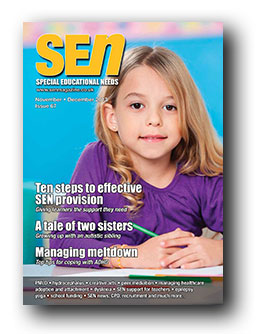Francesca Barrett is an SEN Teaching Assistant, who also wrote previously on SEN reading and writing. Below she details her account on concentration during lessons.
Pupils who suffer with an inability to concentration will find their daily school life a challenge. Many of these pupils are wrongly labelled as ‘naughty’ or children with behavioural problems, with the real reason being down to them suffering from a disorder that affects their concentration levels. Attention Deficit Hyperactivity Disorder (ADHD) or Attention Deficit Disorder (ADD) are two of the most common disorders with these symptoms and can, at times, reach fever pitch unexpectedly causing pupils to break school rules. This can be both frustrating and upsetting for the pupil and will need to be dealt with in a calm and collected manner with understanding and care. This lack of concentration can affect many parts of school life and with specialist help from teaching staff pupils can learn to overcome some of the struggles that come with having an attention deficit disorder. Sitting for long periods of time is a challenge for most pupils but add in the inability to concentrate and this becomes a greater challenge. Pupils who suffer from a lack of concentration are seen daydreaming when the rest of the class is paying attention missing out on valuable teaching time. As a result they may fall behind and become less motivated, with their confidence and self-esteem also being affected.
For primary school pupils, their lack of concentration can be easier to deal with, and the help they get at this stage will benefit them in their future learning. If they are required to sit for a long period of time to complete a piece of work, allowing them the opportunity to get out of their seat after a set period can reduce their chances of daydreaming or frustration creeping in. If they can achieve this with little disruption to the rest of the class, praise must be forthcoming. A gold star or a special merit at the end of the week for good behaviour will make such a difference to these struggling pupils. This will encourage further good behaviour and a pattern will begin to build up. Work consisting of large amounts of words should be replaced by a mixture of words, images and diagrams, with activities kept short and interesting. This allows struggling pupils to participate in class and help keep their focus.
Unless there is a necessary need to remove a pupil who is unable to concentrate from class, they should remain amongst their classmates and where possible teamed up with pupils they will learn from.
Older pupils who lack concentration skills can behave very differently when in class. They become frustrated at their inability to focus like their classmates or find the lesson just doesn’t hold their attention. These pupils can become disruptive, get out of their seats and try to distract the other pupils, giving them the label ‘nuisance’ or ‘irritating.’ The best way to deal with this is not to completely exclude this pupil as that will only alienate them from the rest of the class and could possibly lead to further problems. Setting aside a workspace away from the class and allowing them to work from a prepared worksheet with the aid of a teaching assistant or possibly another pupil who they have been known to work well with. However, if their behaviour goes beyond a mere lack of concentration, then removing them from the class will be the only option. Sometimes a brief spell away from their normal environment can be beneficial. Most secondary schools have a SEN support area where pupils can be sent for one-to-one teaching and help. This is known to work extremely well and allows the struggling pupil to work at their own pace. Be aware of what provisions your school has in place for pupils with these types of struggles.
Plan ahead for any potential difficult situations that may occur and how you will help to limit them. If you are aware that a lesson will require pupils to take notes or need to follow particular set of instructions, and you feel that one or two pupils will find the need to concentration difficult, draw up a small hand-out. You may find that not only pupils who suffer from a lack of concentration who will benefit from this hand-out, pupils who find writing at speed difficult, or have poor hand/eye co-ordination or possibly suffer from ear/eye problems will also find this hand-out extremely helpful.
 SEN Magazine is the UK’s leading special educational needs magazine and covers a diverse range of topics in its bimonthly editions. Its readership includes SENCOs, parents, therapist, teachers and other specialists in the area of special educational needs.
SEN Magazine is the UK’s leading special educational needs magazine and covers a diverse range of topics in its bimonthly editions. Its readership includes SENCOs, parents, therapist, teachers and other specialists in the area of special educational needs.
 If you’re looking to advance your career or develop new skills in special educational needs, then take a look at SEN Magazine. Register for your free issue by emailing
If you’re looking to advance your career or develop new skills in special educational needs, then take a look at SEN Magazine. Register for your free issue by emailing 